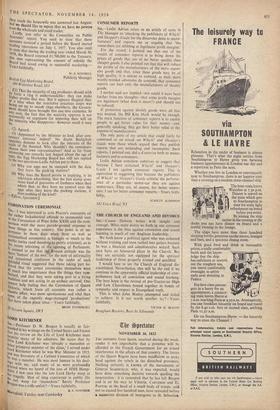CONSUMER REPORTS
SIR,—Leslie Adrian refers to an article of mint in The Manager as 'attacking the publishers of Which? and Shopper's Guide for the disservice done to manu- facturers" and 'reports me as arguing that 'the researchers are nibbling at legitimate profit margins.'
For the record. I pointed out that one of the results of consumer reports is to bring down the prices of goods that are of no better quality than cheaper goods. I also pointed out that this will reduce the profits'of the manufacturers of the more expen- sive goods and that, since these goods may be of high quality, it is untrue to contend, as their more woolly-minded advocates do contend, that consumer reports can hurt only the manufacturers of shoddy goods.
I neither said nor implied—nor could it have been further from my thoughts—that some profit margins are legitimate (what does it mean?) and should not he reduced.
If protection against shoddy goods were all that was wanted, the BSI Kite Mark would be enough. The main function of consumer reports is to enable people to get better value for their money—.-and, generally speaking, they get their better value at the expense of manufacturers.
The only parts of my article that could fairly he construed as an attack on Which? and Shopper's Guide were those which argued that they publish reports that are. misleading and incomplete. Such reports, I pointed out, did a d:sservice both to manu facturers and to consumers Leslie Adrian somehow contrives to suggest that because I have criticised Which? and Shopper's Guide I am against consumer reports. This is equivalent to suggesting that because the publishers of Which? or Shopper's Guide criticise the perform- ance of a particular motor-car they are against motor-cars. They are, of course, for better motor- cars. 1 am for better consumer reports.—Yours
fully,






































 Previous page
Previous page